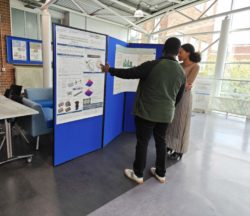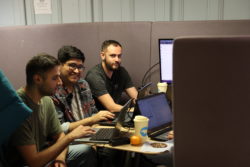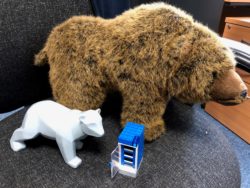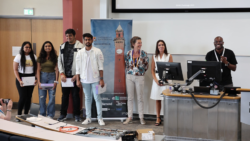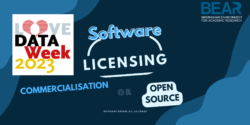Created by several members of the Research Software Group (RSG) In April the RSG organised its first ever team hackathon. For two weeks, all team members had time set aside from their regular project work to join in the various sessions offered. We were encouraged to sign up for anything that was interesting to us … Continue reading “BEAR RSG Hackathon 2024”
Category: Events
Reflecting on the 13th Annual BEAR Conference 2024
The following blog post has been written by Dr. Josephine Bates, who shares her thoughts on the BEAR Conference 2024. From the 23 to 24 April, 2024, the 13th annual BEAR (Birmingham Environment for Academic Research) Conference took place in the Chemical Engineering building at the University of Birmingham. The conference revolved around High-Performance Computing … Continue reading “Reflecting on the 13th Annual BEAR Conference 2024”
BEAR Challenge 2023: A whirlwind of GPUs, AI, pizza and future prospects
The BEAR Challenge 2023 was an exciting three day event that allowed students to access a national Tier 2 supercomputer – the Baskerville High-Performance Computing (HPC) system, as well as hearing about careers in the area from leading industry specialists. Students tackled real-world problems in Artificial Intelligence (AI) using Baskerville’s GPUs. Pros.pro BEAR Challenge team … Continue reading “BEAR Challenge 2023: A whirlwind of GPUs, AI, pizza and future prospects”
BEAR Conference 2024 Agenda
If you want to attend the BEAR Conference 2024, then please register via the BEAR Conference web page. Day 1 – Tuesday 23rd April Time Speaker Title 09:30 Coffees, Networking and Posters (Atrium) 10:00 Day 1 Welcome (G35) 10:10 Carol Sandys Head of ARC BEAR State of the Union 10:30 Keynote: Neil Ashton How HPC, … Continue reading “BEAR Conference 2024 Agenda”
R User Group Event – Data Visualisation Seminar!
In this month’s R User Group meeting, with speakers Laura Bravo Merodio and Jack Sullivan, we look at data visualisation with ggplot2, and tips and tricks for making plots accessible to all. Date Tuesday 6 February 2024 Time 12:00 – 13:00 Location HybridIn-person: Elm House, G08ONLINE: Teams Meeting Link AgendaChair: Katy IvisonTalk 1: “An Introduction To … Continue reading “R User Group Event – Data Visualisation Seminar!”
Digital Research Conversations – Sustainable Computing
In our 9th Digital Research Conversation, held on the 13th December 2023, researchers and Advanced Research Computing staff gave us an insight into how and why sustainable research computing should be on everybody’s agenda. Kirsty McCready, our Research Engagement and Data Group Intern, led the event and provides a summary below. There is no question … Continue reading “Digital Research Conversations – Sustainable Computing”
BEAR Challenge 2023
“The event was fun, challenging, and insightful. The best part was that it gave me an opportunity to work and learn something new with my friends. Thank you, team!” This is a quote from one of the participants who attended the BEAR Challenge held between 19th-21st June. The aim of the challenge is to introduce … Continue reading “BEAR Challenge 2023”
Bringing to BEAR – Creating a Challenge for the BEAR Challenge
This year June came around again and it’s BEAR Challenge time! This is an event we hold every year to try and introduce University of Birmingham undergraduates and masters’ students to the world of High-Performance Computing (HPC). This year we attracted ten groups of students from across the university from computer science, physics, maths, and … Continue reading “Bringing to BEAR – Creating a Challenge for the BEAR Challenge”
Digital Research Conversations – Love your Code/Software
Software is increasingly important for researchers, with both research staff and students finding themselves needing to write and develop their own software to produce data (e.g. through simulations) or analyse their results. There is a need to understand how to manage software used in research, including its curation, citation and how to store and share … Continue reading “Digital Research Conversations – Love your Code/Software”
BEAR PGR Conference 2023
Over two days in April (19-20), BEAR users came together to meet and hear about the fascinating research that Postgraduate Researchers (PGRs) and academic staff are undertaking on the University’s supercomputer, BlueBEAR. The BEAR PGR Conference is an annual event where we give PGRs an opportunity to get experience in running a conference, gaining skills … Continue reading “BEAR PGR Conference 2023”


